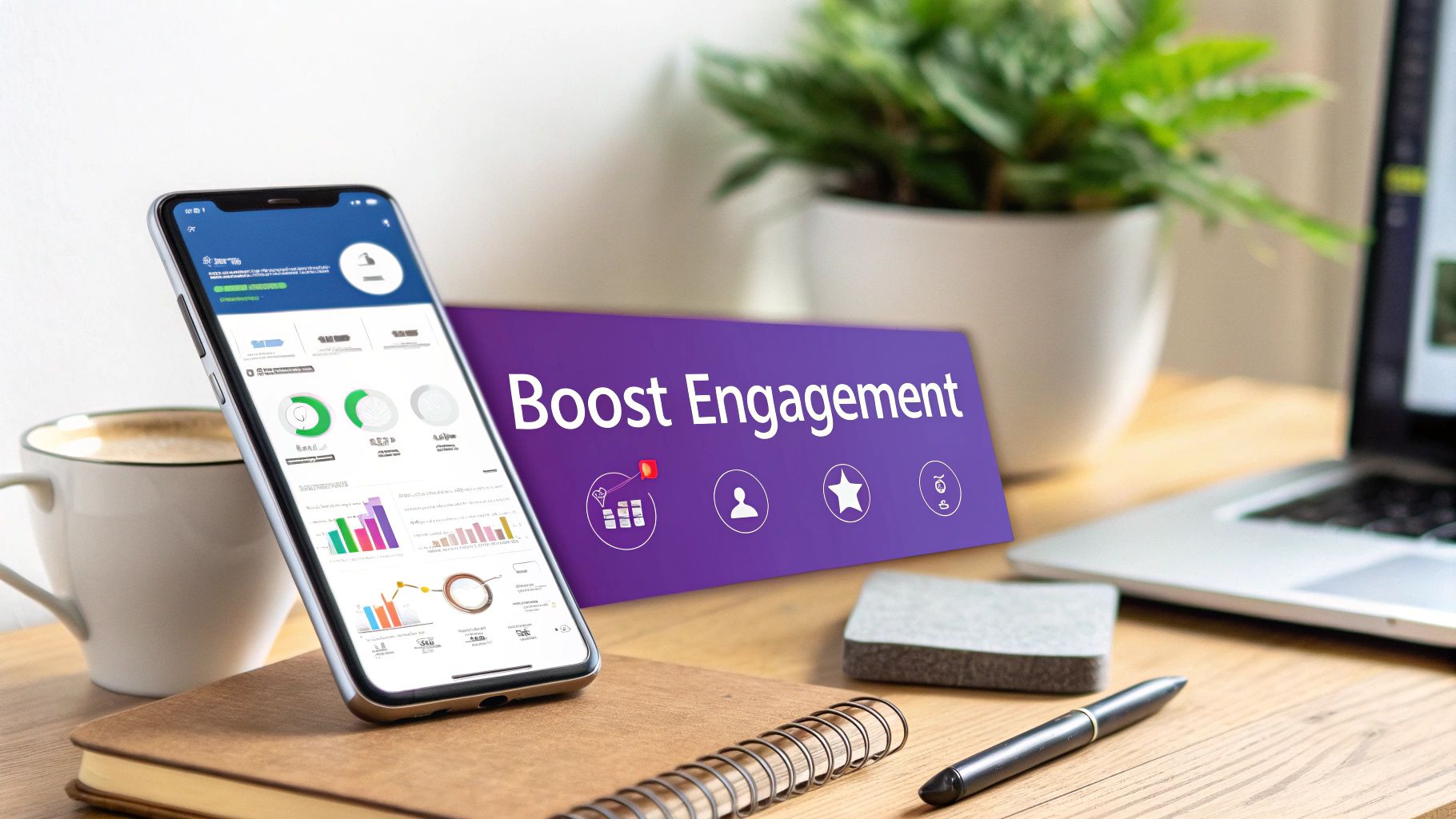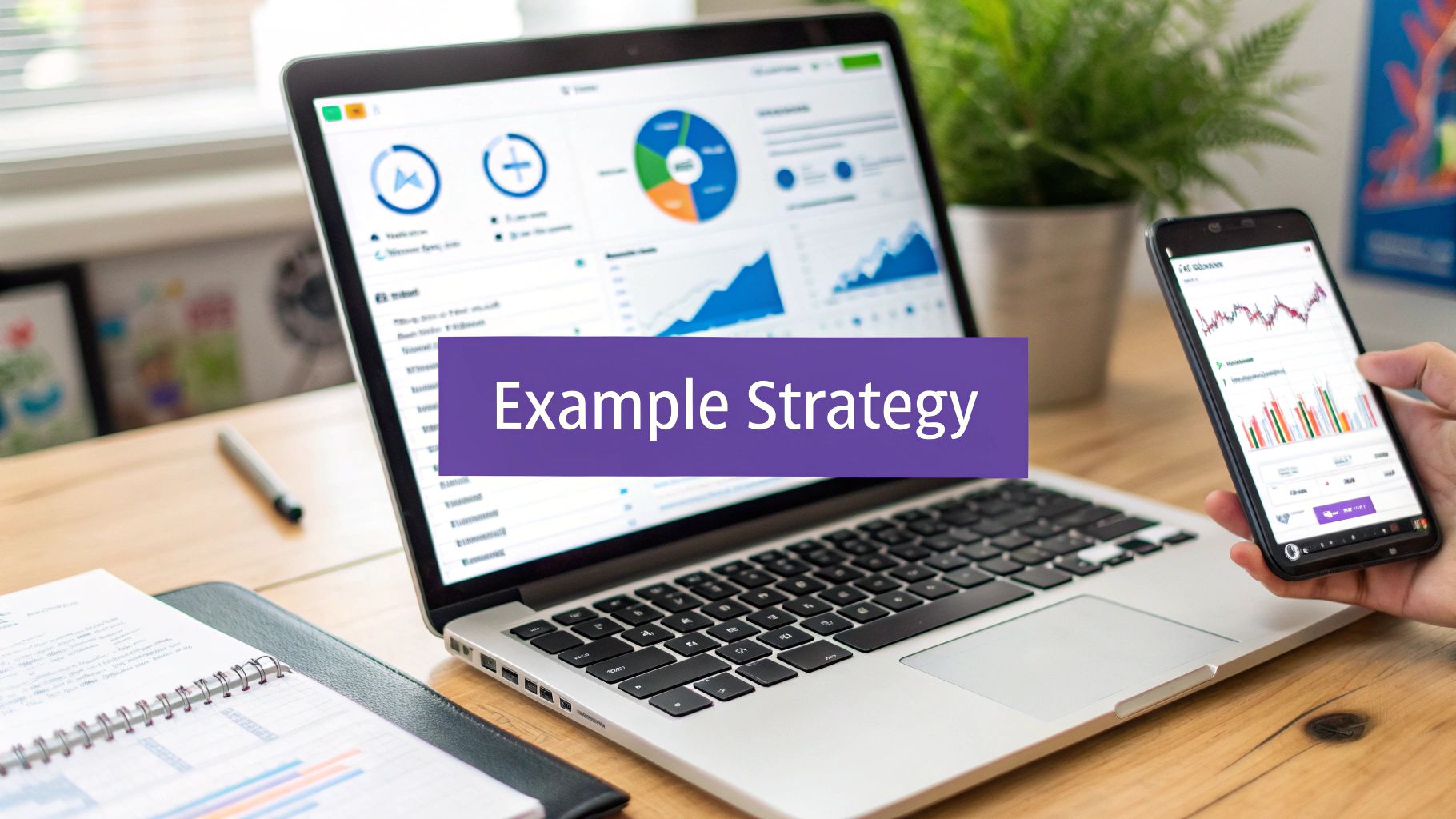12 Best Digital Marketing Tools for Small Business in 2025
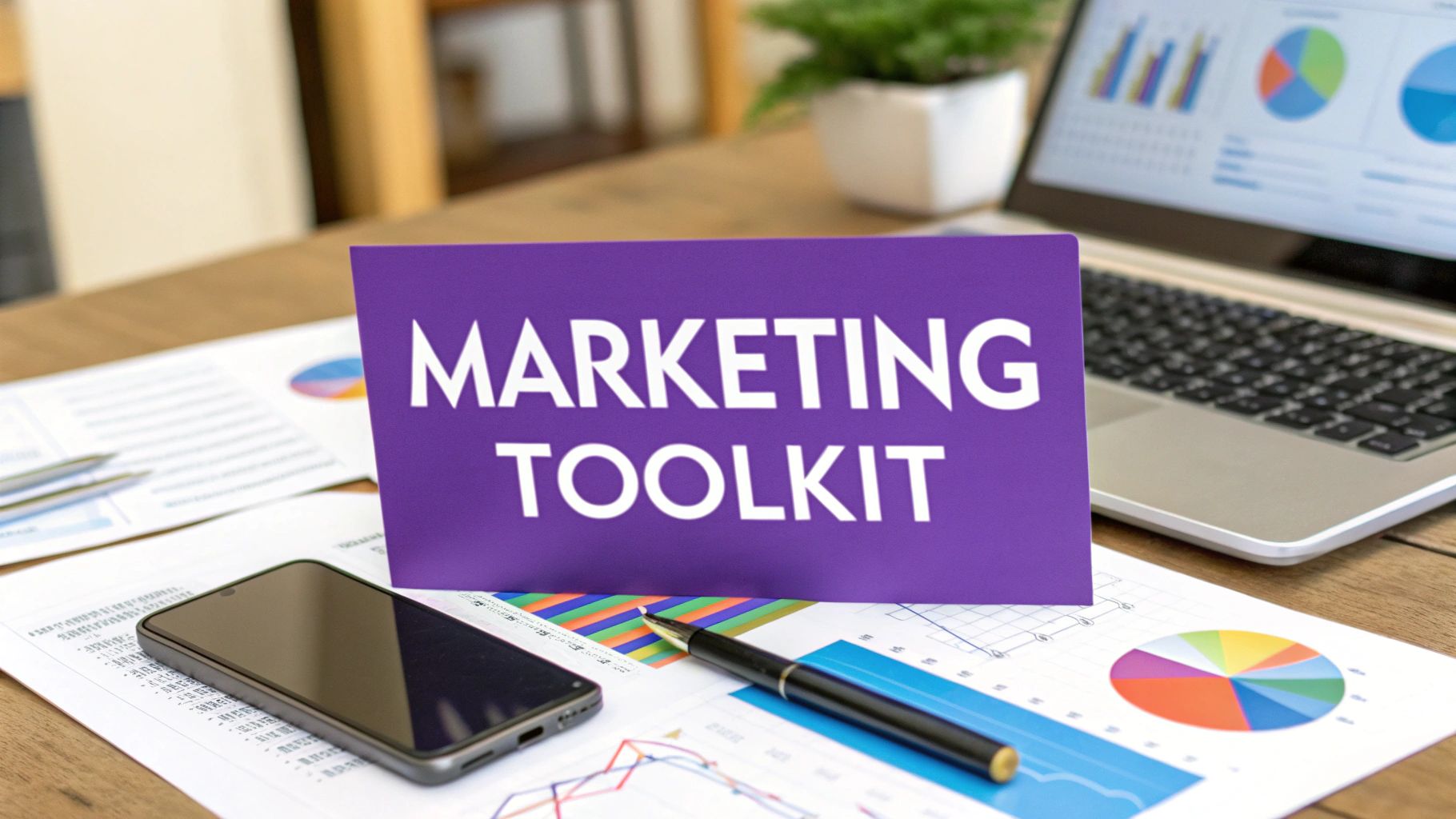
Navigating the digital landscape as a small business can feel like trying to win a marathon in sneakers while competitors have jetpacks. The secret isn't just working harder; it's working smarter. The right digital marketing tools for small business automate tedious tasks, provide critical data, and amplify your message, giving you the leverage to compete with bigger players. But with thousands of options, how do you choose?
This guide cuts through the noise. We've compiled a comprehensive list of the 12 best platforms that solve real-world challenges, from building a powerful brand presence to driving sales and analyzing results. Forget generic feature lists and marketing fluff. Here, you will find a detailed, side-by-side rundown of each tool, focusing on practical use cases, honest limitations, and specific implementation advice tailored for small business owners, freelancers, and startup founders.
Our goal is to help you find the best platforms for your specific needs, fast. Each entry includes:
- A concise summary of what the tool does and who it's for.
- Key features analyzed from a small business perspective.
- Honest pros and cons based on real-world usage.
- Clear pricing information to fit your budget.
- Screenshots and direct links to help you evaluate each option quickly.
Whether you're looking to master SEO with tools like Semrush, launch effective campaigns with Meta Ads Manager, or streamline your email marketing with Mailchimp, this resource provides the clarity you need to make informed decisions. Let's find the tools that will become your business superpower.
1. MakerBox
MakerBox emerges as a standout choice among digital marketing tools for small business, specifically for those aiming to rapidly build a powerful and professional online brand presence. It leverages proprietary AI, trained on over 100,000 high-performer profiles, to automate and optimize the foundational elements of personal and business branding on key platforms like LinkedIn and X (formerly Twitter). In less than a minute, the platform generates tailored bios, engaging social media content, and even professional-grade profile photos, making it an indispensable asset for entrepreneurs and consultants who need to project authority without a large marketing team.
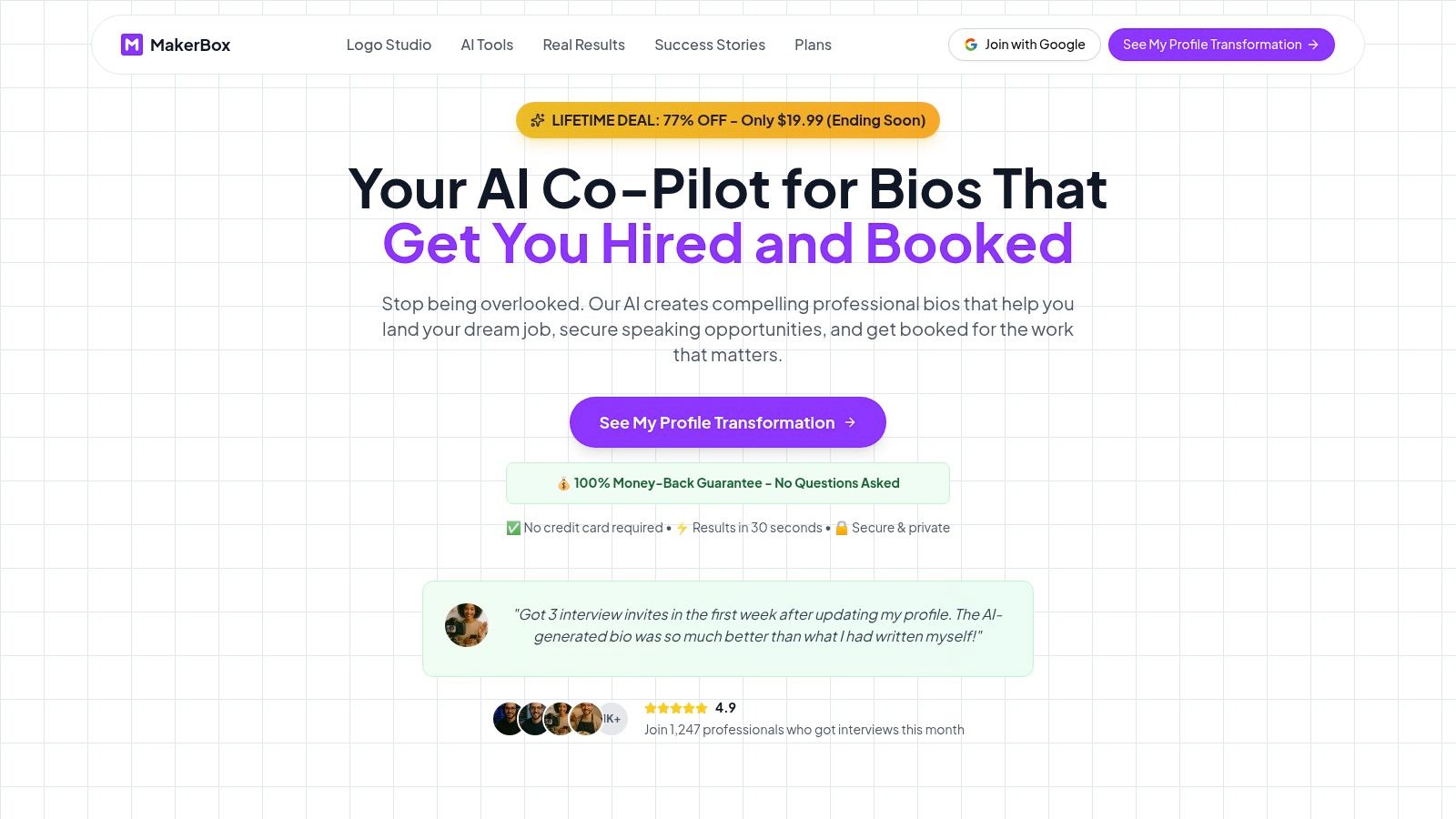
What sets MakerBox apart is its holistic approach to profile optimization, translating directly into tangible business results. Its AI-driven enhancements are engineered to deliver a reported 3.5× increase in profile engagement and an 87% boost in connection requests. For a small business, this means more inbound client inquiries, partnership opportunities, and an accelerated path to establishing industry credibility. The platform's ability to transform a simple selfie into over 10 distinct, professional avatar styles also eliminates the cost and logistical hassle of a professional photoshoot, a common pain point for new businesses.
Key Features & Use Cases
- AI-Powered Profile Building: Instantly generate optimized bios and content for LinkedIn, X, Reddit, and Mastodon. This is ideal for founders who need to establish a strong personal brand to attract investors or early customers.
- AI Portrait Magic: Create a diverse set of professional headshots from a single photo. A small business can use these avatars across all digital platforms for consistent and high-quality branding.
- Content Library & Scheduler: Manage and schedule social media posts directly from the platform, saving hours on content creation and multi-platform management. This function is particularly useful for service-based businesses maintaining an active online presence.
- Agency-Ready Workspaces: Freelancers and small marketing agencies can manage multiple client profiles from a single dashboard, complete with white-labeling features for a seamless client experience.
Pricing & Access
MakerBox offers a highly competitive Lifetime Deal at $19.99, a significant discount from its regular pricing. This one-time purchase provides unlimited AI generations and all future updates. A key consideration is that users must connect their own OpenAI (or similar provider) API key, which gives them full control over AI usage costs but does require an external account.
- Pros:
- AI-driven optimization delivers quantifiable increases in engagement and connections.
- Saves significant time and money on content creation and professional photography.
- Exceptional value with the Lifetime Deal and user-controlled AI costs.
- Cons:
- Requires users to set up and manage their own API key from a provider like OpenAI.
- Results can vary depending on the user's industry and level of active engagement.
For any small business focused on building a strong personal or company brand online, MakerBox provides a uniquely powerful and cost-effective toolkit.
Website: https://www.makerbox.io
2. HubSpot
HubSpot stands out as an all-in-one digital marketing powerhouse built around a robust, and famously free, Customer Relationship Management (CRM) system. Unlike many tools that focus on a single marketing channel, HubSpot integrates email marketing, landing pages, forms, ad management, and social media scheduling directly with your contact database. This unified approach eliminates the common small business headache of syncing data between separate platforms, providing a single source of truth for all customer interactions.
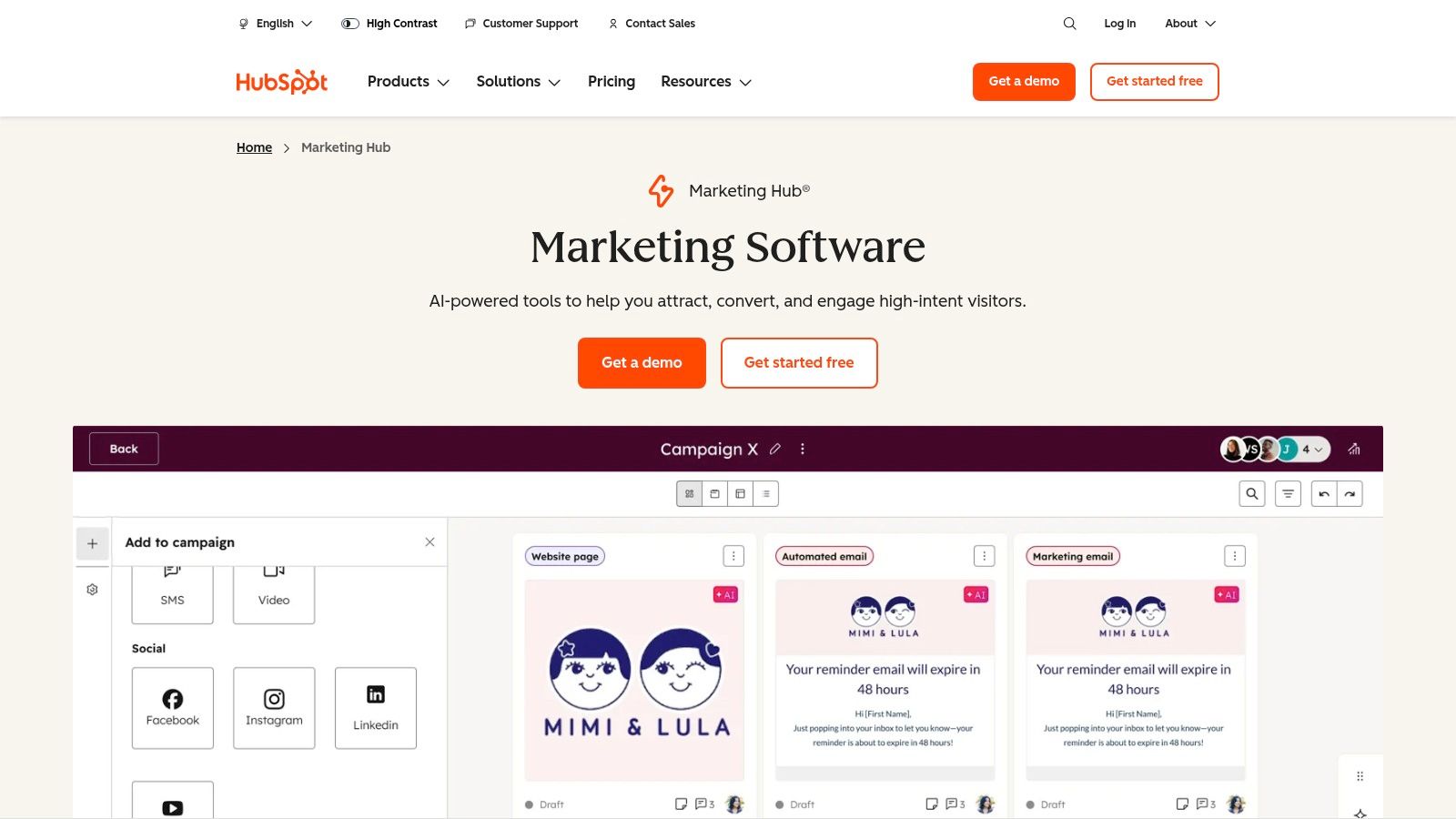
This platform is one of the best digital marketing tools for small businesses because it scales directly with your growth. You can start with the generous free plan, which includes the CRM and basic marketing tools, and then upgrade to paid tiers as your needs for advanced automation, lead scoring, and in-depth reporting dashboards expand.
Key Features & Considerations
- Pricing: A powerful free plan is available. Paid Marketing Hub plans start at $18/month (billed annually) for the Starter tier, scaling up to Professional and Enterprise levels. Be mindful that costs increase based on marketing contact numbers and user seats, and higher tiers often require a one-time onboarding fee.
- Pros: The native integration between the marketing tools and the free CRM is a game-changer for data consistency. The platform offers a clear upgrade path, preventing the need to migrate systems as you grow.
- Cons: The platform can become expensive quickly as your contact list grows or you need features from the Professional tier and above. The sheer number of features can present a steep learning curve for absolute beginners.
Website: https://www.hubspot.com/products/marketing
3. Mailchimp
Mailchimp has long been the go-to platform for small businesses diving into email marketing, and for good reason. It offers an incredibly intuitive interface that simplifies creating, sending, and tracking email campaigns. Beyond simple newsletters, Mailchimp provides essential tools like landing pages, web forms for lead capture, and basic CRM functionalities to manage your audience, making it a comprehensive starting point for customer communication. Its strength lies in its user-friendliness and extensive template library, allowing businesses to launch professional-looking campaigns quickly without a steep learning curve.
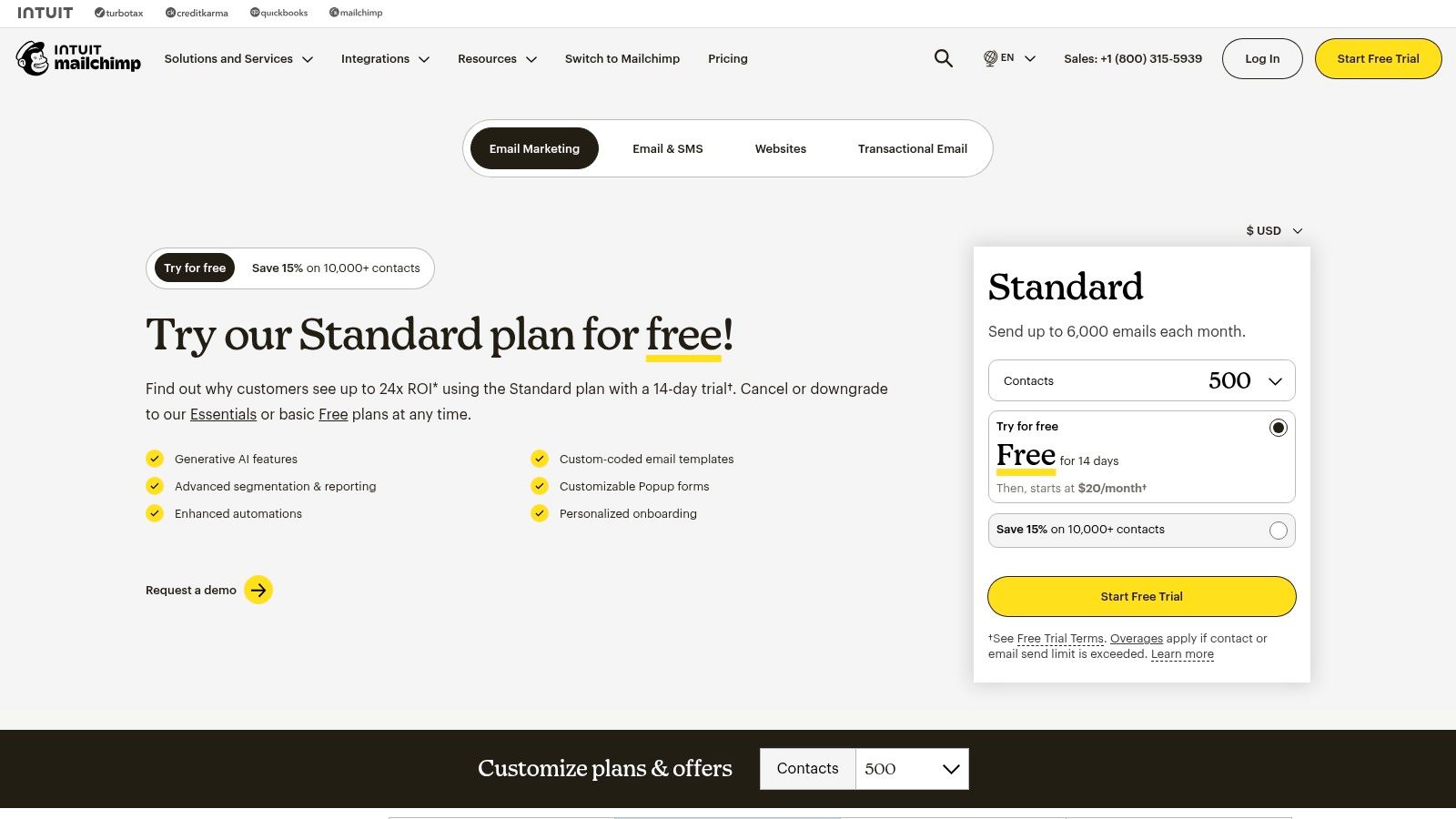
As one of the most established digital marketing tools for small business, Mailchimp excels at helping you get started. Its powerful automation features, known as "Customer Journeys," allow you to set up welcome series, abandoned cart reminders, and other triggered emails that nurture leads effectively. This focus on core email and automation features makes it an ideal choice for businesses prioritizing direct audience engagement. Building a strong foundation is key, and you can learn how to build an email list on makerbox.io to get the most out of the platform.
Key Features & Considerations
- Pricing: A free plan is available for up to 500 contacts and 1,000 monthly sends. Paid plans (Essentials, Standard, Premium) start at $13/month and increase based on your contact count and feature needs. Select plans offer one-month free trials.
- Pros: The platform is exceptionally easy to start with, thanks to its clean UI and a strong library of professionally designed templates. It is also widely supported by thousands of external tools and integrations.
- Cons: The pricing structure, which is based on both contact count and send limits, can become costly as your audience grows. Some advanced features, like multivariate testing and advanced segmentation, are locked behind higher-priced tiers.
Website: https://mailchimp.com/pricing/marketing/
4. Semrush
Semrush is a comprehensive online visibility and marketing analytics platform that empowers businesses to master their digital strategy. Instead of focusing on a single task, it offers a complete suite of tools for Search Engine Optimization (SEO), Pay-Per-Click (PPC) advertising, social media, and content marketing. This makes it an essential asset for any small business serious about understanding its competitive landscape and identifying opportunities for organic and paid growth.
This platform is one of the best digital marketing tools for small businesses because it provides deep, actionable data on competitors' strategies. You can analyze their top keywords, best-performing content, and backlink profiles, allowing you to reverse-engineer their success and inform your own marketing plan. This level of competitive intelligence is invaluable for finding an edge in a crowded market.
Key Features & Considerations
- Pricing: Plans start with the Pro tier at $108.33/month (billed annually), scaling to Guru and Business tiers. A limited free account is available for basic research. Costs increase with additional users, projects, and specialized add-ons like Local SEO or Trends.
- Pros: The platform offers an unparalleled depth of data for competitive and keyword research. Its all-in-one nature covers most aspects of a digital marketing campaign, from initial research and site audits to rank tracking and content creation.
- Cons: The sheer volume of data and tools presents a significant learning curve for those new to digital marketing. The pricing structure can become costly for small teams, especially when factoring in necessary add-ons for specific business needs.
Website: https://www.semrush.com/pricing/
5. Ahrefs
Ahrefs is a premium SEO toolkit renowned for its comprehensive data, particularly its massive backlink index and highly accurate keyword research capabilities. For small businesses serious about organic growth, it moves beyond basic analytics to provide deep insights into search engine performance. Instead of just showing you how you rank, Ahrefs reveals why you rank, who links to you, what keywords your competitors are winning, and what content is performing best in your niche.
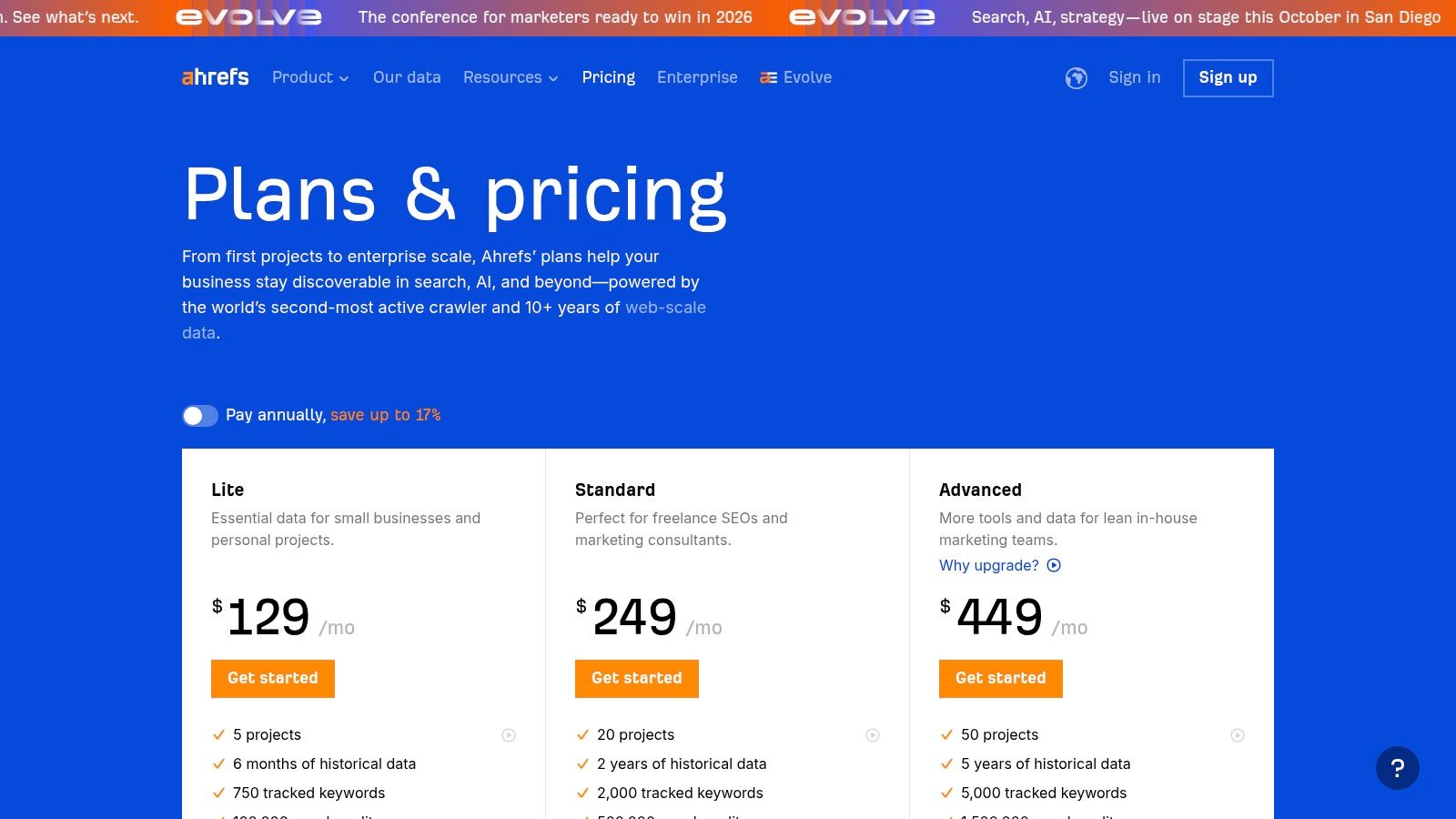
This platform is one of the essential digital marketing tools for small businesses because it provides the competitive intelligence needed to build a winning SEO strategy. Its tools, like Site Explorer and Keywords Explorer, allow you to deconstruct competitor success and identify actionable opportunities. By understanding the search landscape with such clarity, you can create content and build links that have a measurable impact, turning SEO from a guessing game into a data-driven marketing channel. This strategic depth is why many consider it a foundational tool for a robust competitor analysis framework.
Key Features & Considerations
- Pricing: A free Ahrefs Webmaster Tools plan is available for site owners to audit their own sites. Paid plans start at $99/month for the Lite tier, scaling to Standard, Advanced, and Enterprise plans with more features and higher usage limits.
- Pros: The backlink and SERP data are widely considered industry-leading in terms of accuracy and depth. The Site Audit and Keywords Explorer tools are incredibly powerful for identifying technical issues and content opportunities.
- Cons: The premium pricing can be a significant investment for businesses just starting with SEO. The most powerful features and generous data limits are reserved for the higher-priced tiers, which may be out of reach for some small businesses.
Website: https://ahrefs.com/pricing
6. Google Ads
Google Ads is the undisputed leader in self-serve advertising, allowing businesses to place their message directly in front of users actively searching for their products or services. It operates on a pay-per-click (PPC) model, enabling small businesses to reach a massive audience across Google Search, YouTube, and partner websites with complete budget control. Unlike organic strategies that take time, Google Ads provides an immediate way to capture high-intent traffic and drive conversions.
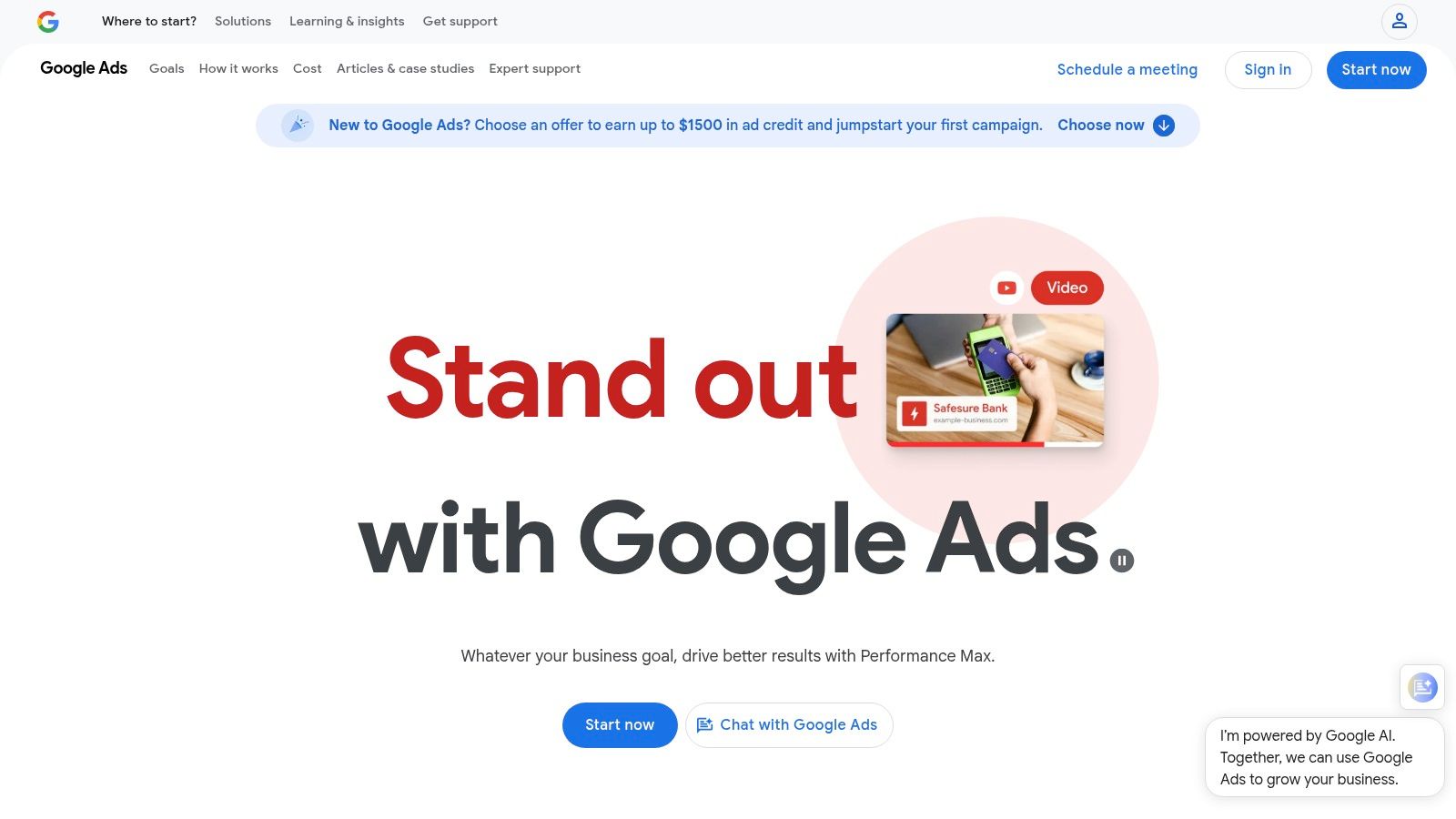
This platform is one of the most powerful digital marketing tools for small business owners looking for scalable lead generation and sales. Its strength lies in its precision; you can target users based on keywords, location, demographics, and past online behavior. For those new to paid advertising, platforms like Google Ads are a primary driver for many successful strategies for lead generation for small businesses.
Key Features & Considerations
- Pricing: Completely flexible pay-per-click model. You set your own daily and monthly budget limits and only pay when a user clicks your ad. There are no monthly subscription fees, but campaign costs can vary significantly based on industry competition and targeting.
- Pros: Unmatched reach on the world's largest search engine, targeting users at the exact moment of intent. The platform offers incredibly robust measurement tools to track return on ad spend (ROAS) and optimize for conversions. It's highly scalable, allowing you to start small and increase spend as you see results.
- Cons: The auction-based system can become very expensive for competitive keywords, requiring careful management to remain profitable. The platform has a significant learning curve, and a poorly managed campaign can quickly exhaust a budget with little to show for it.
Website: https://ads.google.com/
7. Meta Ads Manager
Meta Ads Manager is the indispensable command center for any small business looking to leverage paid social advertising on Facebook and Instagram. Unlike boosting posts directly from your page, this platform provides granular control over every campaign element, from hyper-specific audience targeting to ad placement and creative A/B testing. This allows businesses to move beyond simple visibility and drive specific outcomes like website traffic, lead generation, or online sales with precision.
This tool is one of the most powerful digital marketing tools for small businesses because it makes sophisticated advertising accessible. You can start with a very small daily budget and scale up as you find winning ad combinations. Its detailed reporting provides direct insight into what messaging and visuals resonate with your audience, making it a crucial engine for both customer acquisition and market research. If you're new to the space, you can learn more about how social media works for entrepreneurs to build a solid foundation.
Key Features & Considerations
- Pricing: The platform itself is free to use; you only pay for the ad budget you set. You can start with as little as a few dollars per day. Costs are based on an auction system (CPM or CPC), so prices vary by audience and competition.
- Pros: It offers unparalleled reach and incredibly detailed targeting options, including custom audiences for retargeting website visitors. The flexible budget controls allow you to pause, adjust, or stop campaigns at any time, minimizing financial risk.
- Cons: The platform's performance can be inconsistent during the initial "learning phase" of a campaign. Daily spend can sometimes exceed your set daily budget due to pacing rules, although it will not exceed your total weekly or lifetime campaign caps.
Website: https://business.facebook.com/adsmanager
8. Canva
Canva has become the go-to design platform for small businesses that need to create professional-looking marketing assets without a dedicated designer. It democratizes design, offering an intuitive drag-and-drop interface and a vast library of templates for social media posts, ads, videos, presentations, and more. This accessibility allows entrepreneurs and small marketing teams to maintain a consistent and high-quality visual brand presence across all digital channels, from Instagram stories to email newsletters.
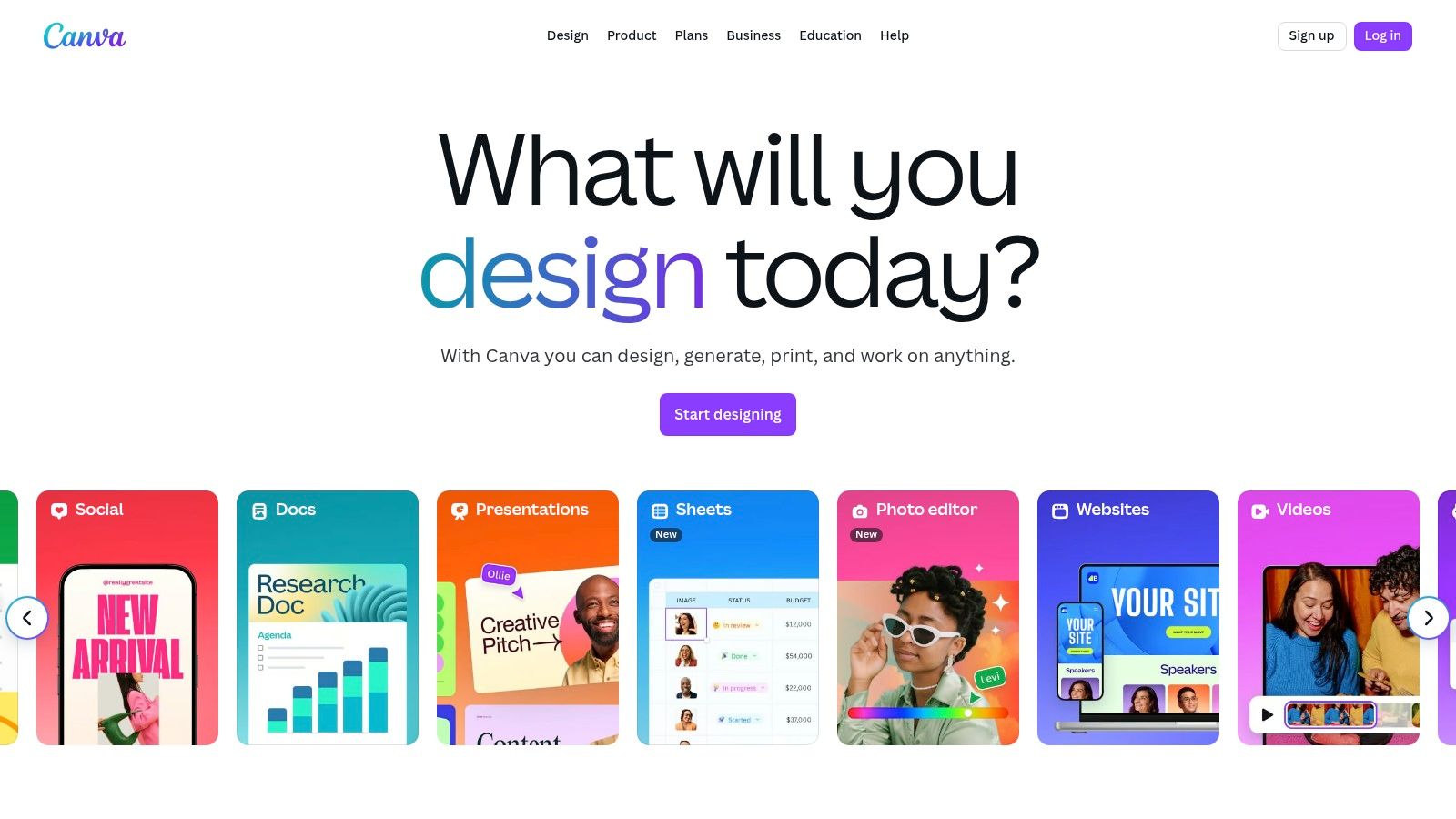
The platform is one of the essential digital marketing tools for small business because it dramatically speeds up the content creation workflow. Instead of starting from scratch, you can adapt a professionally designed template in minutes. Features like Brand Kits ensure all creations adhere to your company's colors and fonts, while collaboration tools let team members review and approve designs seamlessly. For a deeper dive into the creative process, you can learn how to create engaging content using tools like Canva.
Key Features & Considerations
- Pricing: A comprehensive free plan is available with generous features. Canva Pro starts at $119.99/year for one person. Canva for Teams pricing is based on the number of users, starting at $100 per person/year for the first five people.
- Pros: Extremely user-friendly for non-designers, with a massive library of templates and stock assets. The Brand Kit and collaboration features are excellent for maintaining brand consistency across a team.
- Cons: Designs can sometimes look generic if templates are not heavily customized. While powerful, it is not a replacement for professional design software like Adobe Photoshop or Illustrator for highly complex or original creative work.
Website: https://www.canva.com/
9. Shopify App Store
For e-commerce small businesses built on Shopify, the official App Store is less a single tool and more of a mission-critical marketing ecosystem. It acts as a curated marketplace of official and third-party applications designed to plug directly into your store, covering everything from email and SMS marketing to advanced SEO, customer reviews, and social media advertising. This native environment ensures that data flows seamlessly between your marketing efforts and your core sales platform.
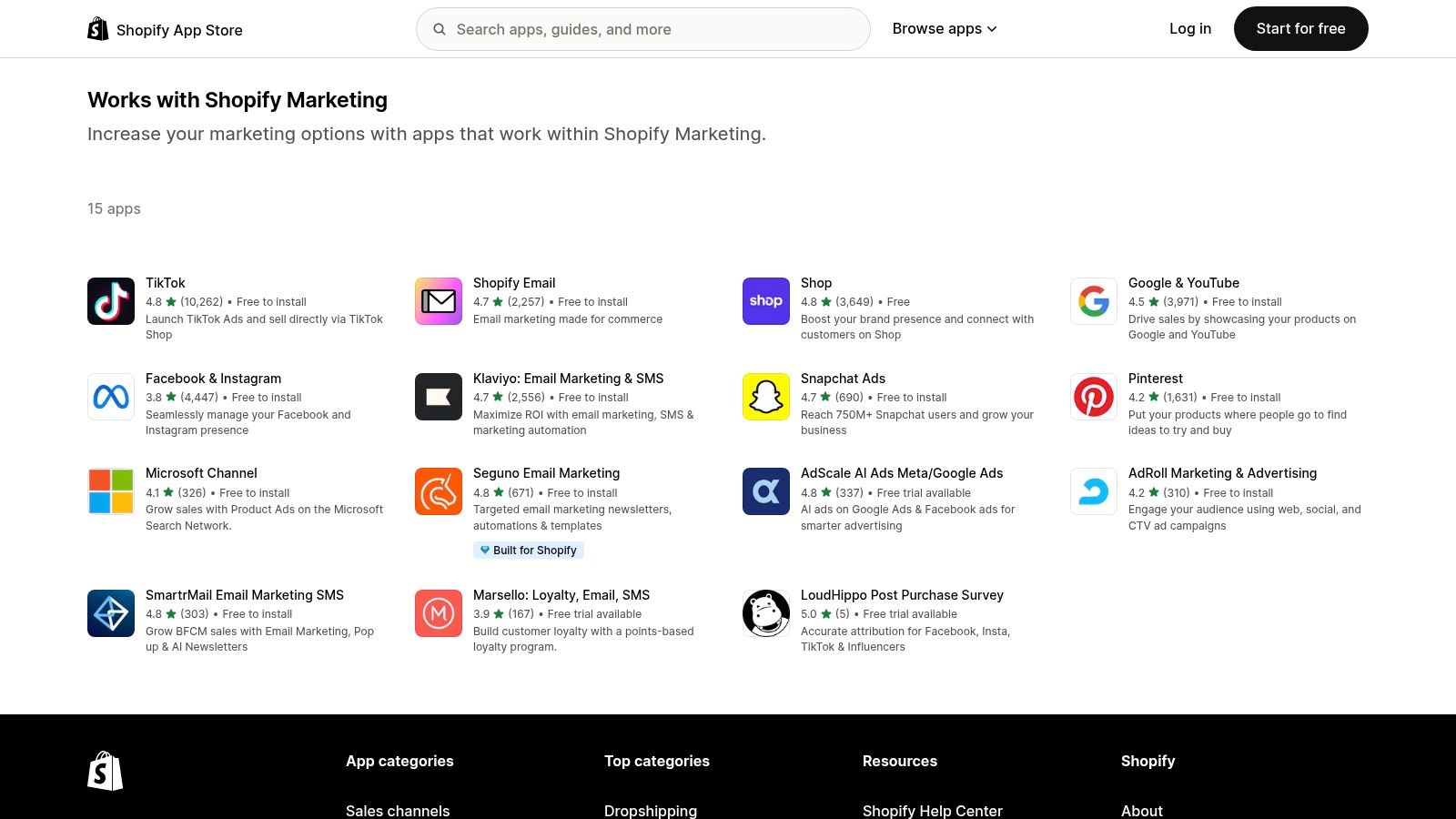
This platform is one of the most essential digital marketing tools for small business owners in the direct-to-consumer space because it eliminates complex integrations. Instead of wrestling with APIs, you can add powerful functionality with a few clicks, installing apps like Klaviyo for email automation, TikTok for ad management, or Loox for photo reviews. To expand your Shopify store's capabilities and boost sales, check out the best Shopify marketing apps to skyrocket revenue.
Key Features & Considerations
- Pricing: Many apps are free to install or offer a freemium model with paid tiers that unlock advanced features. Paid apps vary widely, from a few dollars per month to hundreds, depending on complexity and usage.
- Pros: The one-click installation and deep integration with Shopify data are unparalleled. The vast selection covers nearly every marketing channel and use case imaginable, allowing for a highly customized marketing stack.
- Cons: Costs can add up quickly as you install multiple paid apps, creating a "subscription stack" that can become expensive. The quality of apps varies, so it's crucial to carefully read reviews and ratings before installing.
Website: https://apps.shopify.com/collections/works-with-shopify-marketing
10. WordPress Plugin Directory
For the millions of small businesses running their websites on WordPress, the official Plugin Directory is not just a tool, but an entire ecosystem of digital marketing solutions. Rather than being a single application, it's a massive, searchable library of add-ons that can bolt any marketing functionality imaginable directly onto your site. This includes everything from email capture pop-ups and contact forms to advanced analytics, SEO optimization, and social media integration.
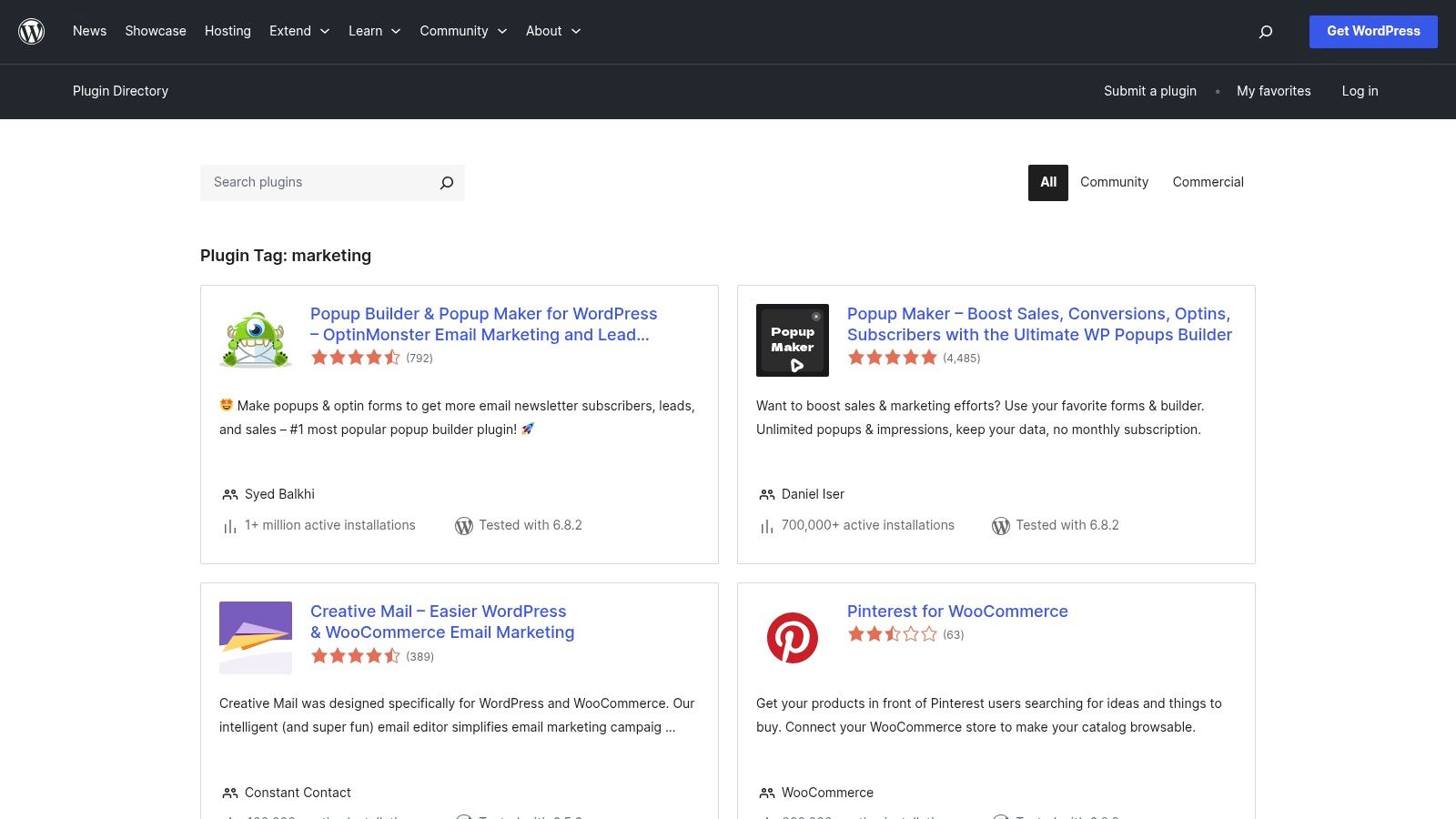
This platform is one of the most essential digital marketing tools for small businesses using WordPress because it allows for unparalleled customization at a low cost. You can hand-pick individual tools for specific tasks, such as adding a simple SEO plugin like Yoast or a comprehensive form builder like WPForms, without paying for a bundled suite of features you don't need. The user review and active installation data provide crucial social proof to help you vet quality.
Key Features & Considerations
- Pricing: The directory itself is free to access. Many plugins operate on a "freemium" model, offering a free version with core functionality and paid "Pro" versions for advanced features. Costs vary widely from one-time fees to annual subscriptions.
- Pros: The sheer volume and variety of available plugins are unmatched, allowing for a highly customized marketing stack. Transparent user reviews, version histories, and compatibility information help in making informed decisions. Many high-quality free options are available.
- Cons: The responsibility for vetting plugin quality, security, and compatibility falls entirely on the user. Managing multiple plugins from different developers can lead to performance issues or conflicts, and advanced features are often locked behind paid upgrades.
Website: https://wordpress.org/plugins/tags/marketing/
11. AppSumo
AppSumo isn't a single tool but a dynamic marketplace offering heavily discounted lifetime and annual deals on emerging marketing software. For small businesses operating on a tight budget, it provides an unparalleled opportunity to build a powerful tech stack for a fraction of the standard cost. The platform curates a rotating selection of SaaS products spanning SEO, email marketing, social media management, AI content generation, and more, making it a goldmine for discovering new and innovative digital marketing tools for small business owners willing to be early adopters.
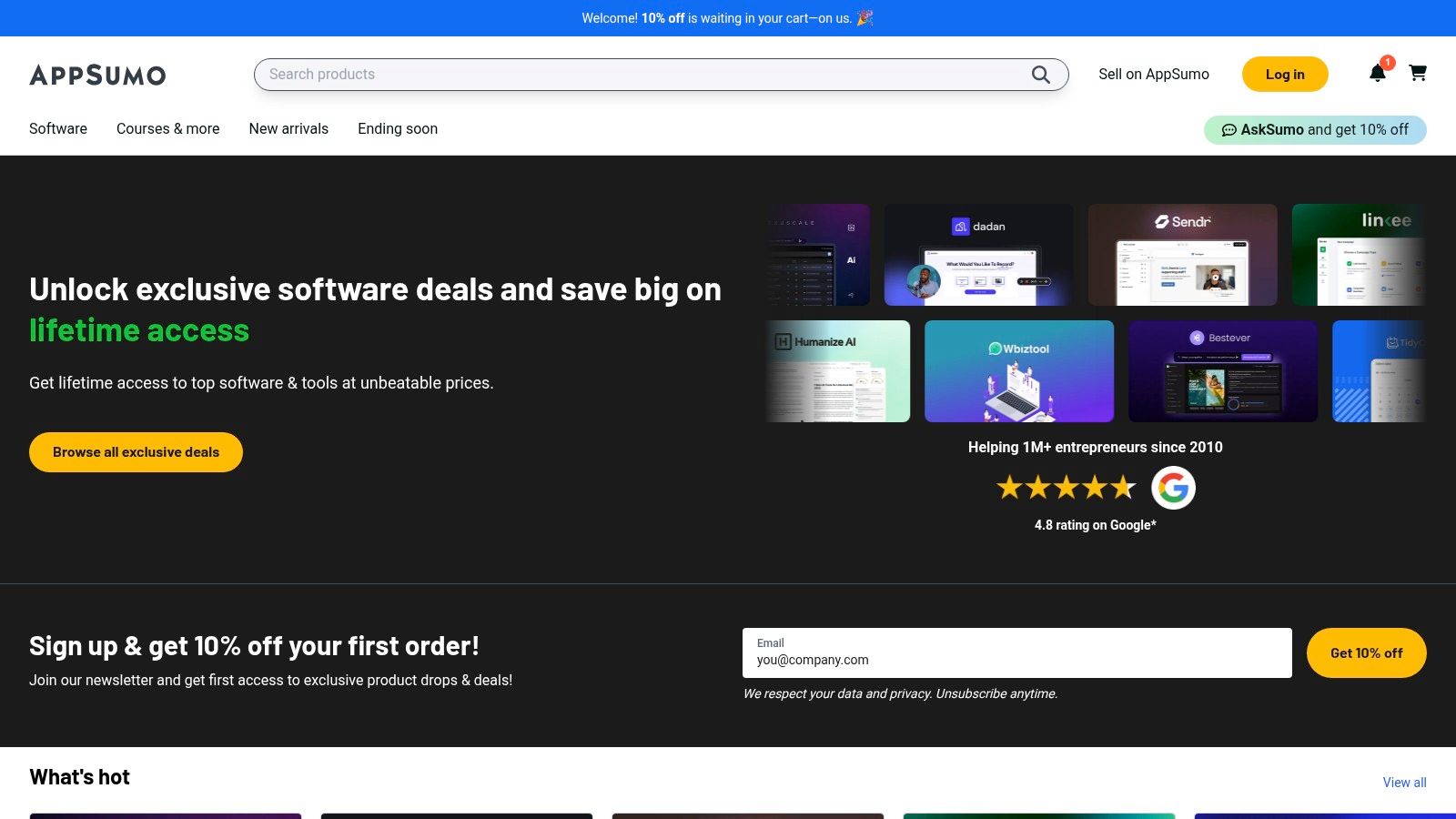
This platform earns its spot by democratizing access to software that might otherwise be financially out of reach. By securing a lifetime deal (LTD), you pay a one-time fee for ongoing access, eliminating recurring monthly subscription costs that can quickly add up. This model allows businesses to experiment with and implement various tools without long-term financial commitment, especially given AppSumo's typically generous refund policies.
Key Features & Considerations
- Pricing: Deals are typically offered as one-time lifetime purchases, ranging from $39 to several hundred dollars depending on the tool's complexity and feature limits. An optional AppSumo Plus membership ($99/year) offers an extra 10% off purchases and other perks.
- Pros: The potential for significant long-term savings is the primary draw. It's an excellent platform for discovering up-and-coming software before it becomes mainstream. Most deals come with a 60-day money-back guarantee, allowing for thorough testing.
- Cons: The quality and long-term viability of the software can be inconsistent, as many are from new or unproven companies. The best deals are time-sensitive and can sell out quickly, creating a sense of urgency.
Website: https://appsumo.com/
12. G2
G2 isn't a marketing tool itself but rather a critical platform for choosing the right tools. It functions as a peer-review marketplace where real users rate and compare business software, including a massive library dedicated to digital marketing. For a small business owner overwhelmed by options, G2 provides an essential layer of social proof, helping you vet potential software based on authentic feedback from companies of a similar size and industry. It cuts through marketing jargon to reveal how a platform actually performs in a real-world setting.
This platform earns its spot as one of the best digital marketing tools for small businesses by mitigating the risk of a bad software investment. Instead of relying on a vendor's sales pitch, you can use G2's comparison grids and detailed reviews to create a shortlist. Filtering by company size ensures the feedback you're reading is relevant to your own operational scale and budget, making it an indispensable research stop before committing to a paid subscription.
Key Features & Considerations
- Pricing: Free to browse and use for research. Vendors pay to list their products and access advanced features, but there is no cost for business users looking for software.
- Pros: The sheer volume of authentic, real-user reviews provides unparalleled insight and reduces purchase risk. The powerful filtering and comparison grids are incredibly helpful for head-to-head software evaluations.
- Cons: Some reviews may be incentivized by vendors, potentially skewing ratings. The platform can also be overwhelming due to the vast number of options, and it only serves as a research tool, redirecting you to vendor sites to buy.
Website: https://www.g2.com/
Key Features and Pricing Comparison of 12 Digital Marketing Tools
| Product | Core Features / Capabilities | User Experience / Quality ★ | Value Proposition 💰 | Target Audience 👥 | Unique Selling Points ✨ |
|---|---|---|---|---|---|
| 🏆 MakerBox | AI-optimized bios, photos, content for LinkedIn, X, Reddit, Mastodon; content library, multi-client workspaces | ★★★★★ 3.5× engagement, 87% more connections | $19.99 Lifetime Deal; unlimited AI usage | Professionals, freelancers, agencies | AI portrait magic (10+ art styles), full API control, white-label options |
| HubSpot | CRM-integrated marketing: email, ads, forms, social scheduling | ★★★★ Good automation & reporting | Freemium to Enterprise; pricing scales with seats/contacts | Small businesses, growing teams | All-in-one CRM and marketing stack |
| Mailchimp | Email marketing, customer journeys, landing pages | ★★★★ Easy start, templates strong | Free tier, pricing based on contacts & sends | SMBs needing email & basic CRM | Broad integrations, easy setup |
| Semrush | SEO, PPC, social media, content marketing tools | ★★★★ Deep data, complex interface | Subscription with add-ons | SMB marketers focusing on organic & paid growth | Competitive research, customizable toolkits |
| Ahrefs | SEO toolkit: backlink index, keyword research, audits | ★★★★ Trusted data, effective SEO | Premium pricing tiers | SMB SEO specialists | Extensive backlink and SERP history data |
| Google Ads | Search, display, YouTube ads campaign management | ★★★★ Flexible budgets and targeting | Pay-as-you-go; budget control | SMB advertisers | Massive reach, robust measurement |
| Meta Ads Manager | Paid social campaigns on Facebook & Instagram | ★★★★ Detailed targeting & automation | Flexible daily & lifetime budgets | Local businesses, ecommerce SMBs | Advantage campaign budget, rich visual formats |
| Canva | Design platform with templates & AI-assisted tools | ★★★★ Fast, easy for non-designers | Free & paid plans; some recent pricing changes | Small teams, agencies | Magic Resize, collaboration features |
| Shopify App Store | Marketplace for Shopify marketing apps | ★★★★ Wide app variety, one-click install | Many free apps; costs add with multiple apps | DTC SMBs using Shopify | Deep Shopify integration, many freemium options |
| WordPress Plugin Dir | Thousands of marketing plugins for WordPress | ★★★★ Community-rated plugins | Mostly free; paid upgrades for advanced features | WordPress SMB site owners | Large plugin ecosystem, transparency |
| AppSumo | Discount deals on marketing software | ★★★★ Savings on lifetime deals | Deals vary; refund windows vary | Bargain hunters, early adopters | Rotating SaaS deals, generous refund policies |
| G2 | Peer reviews & comparisons for marketing tools | ★★★★ Wide coverage, real user reviews | Free platform; no direct purchase | SMB buyers researching tools | Verified user feedback, category rankings |
Building Your Perfect Small Business Marketing Stack
Navigating the landscape of digital marketing tools for small business can feel overwhelming, but building a powerful, cost-effective technology stack is more achievable than ever. We've explored a wide range of platforms, from all-in-one solutions like HubSpot to specialized powerhouses like Semrush and Ahrefs, and from creative engines like Canva to essential advertising platforms like Google and Meta Ads. The key takeaway isn't to adopt every tool on this list; it's to strategically select a core set that directly addresses your unique business challenges and growth objectives.
Remember, the goal is to create an integrated system, not a collection of disconnected software. Your choice should be a direct reflection of your business stage and primary marketing goals. Are you a brand-new startup focused on building an initial audience? A tool like MakerBox is designed to give you that crucial early visibility and a powerful online presence. Is your main priority nurturing customer relationships? Then Mailchimp offers a user-friendly entry into email marketing, while HubSpot provides a scalable path toward a comprehensive CRM.
How to Choose Your Core Marketing Stack
Before you commit to a subscription, take a step back and map out your marketing funnel and customer journey. This exercise will illuminate where your most significant gaps are. To help you make the right choice, consider these guiding principles:
- Start with Your Primary Goal: Don't get distracted by flashy features you don't need. If lead generation is your number one priority, focus on SEO tools and a solid CRM. If brand awareness is the goal, invest in content creation and social media management tools.
- Prioritize Integration: The most powerful marketing stacks are those where data flows seamlessly between platforms. Check for native integrations or compatibility with automation tools like Zapier. A connected system saves time, reduces errors, and provides a unified view of your customer.
- Leverage Free Tiers and Trials: Nearly every tool we've discussed, from Mailchimp to HubSpot, offers a freemium plan or a trial period. Use these opportunities to get hands-on experience. Test the user interface, explore the core features, and see if the workflow fits your team's process before making a financial commitment.
- Think in Tiers: Foundational, Growth, and Optimization:
- Foundational: Every business needs a professional website (WordPress), a way to communicate with customers (Mailchimp), and a tool to create visuals (Canva).
- Growth: Once the foundation is set, add tools for visibility like an SEO platform (Semrush) and targeted advertising (Google Ads).
- Optimization: As you scale, you can incorporate more advanced analytics, a full CRM (HubSpot), and explore marketplaces like AppSumo for specialized solutions.
Implementation and Beyond
Once you've selected your tools, the real work begins. Implementation is not just about signing up; it's about integration into your daily workflow. Dedicate time for your team to learn the platforms. Many of these companies offer extensive tutorials and free certification courses that are well worth the time investment.
Furthermore, as your business evolves, consider adding more direct and personal communication channels. As you build your marketing stack, understanding how to choose and use a small business texting service can open up a powerful new avenue for customer engagement with exceptional open rates. This direct line of communication complements email and social media, creating a more holistic customer experience.
Ultimately, the perfect set of digital marketing tools for a small business is one that empowers you to work smarter, not harder. It automates repetitive tasks, provides actionable data, and frees you up to focus on the creative, strategic work that truly drives growth. Don't be afraid to experiment, re-evaluate your stack quarterly, and make changes as your business needs shift. The right tools will feel less like an expense and more like your most valuable employee.
Ready to build the foundation of your online presence and start getting noticed by your ideal customers? MakerBox is the essential first step in your digital marketing toolkit, designed specifically to help founders and small businesses establish a strong, professional brand online from day one. Get your all-in-one digital presence kit and start building your brand today at MakerBox.


